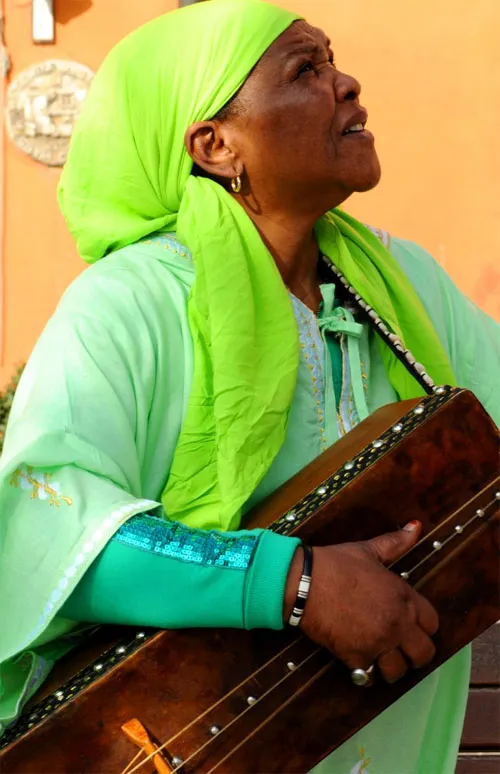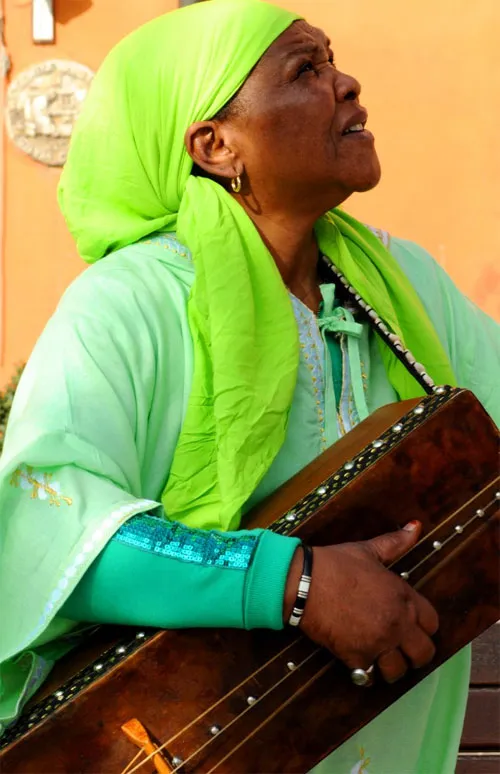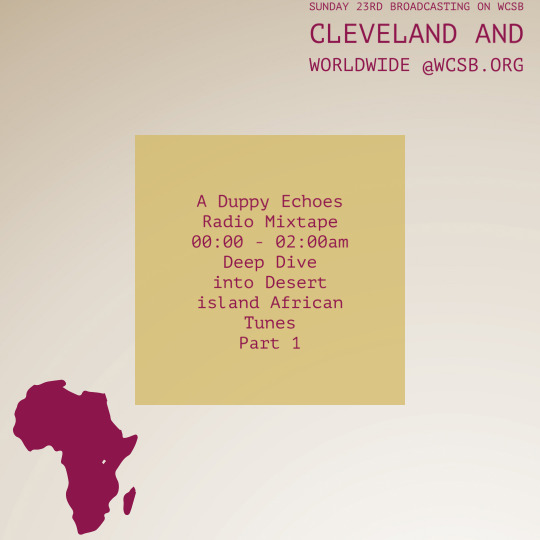#Hasna El Becharia
Explore tagged Tumblr posts
Text
Artist Profiles: Hasna El Becharia
Angel Romero June 10, 2016

Hasna el Becharia
Hasna el Becharia is a female Gnawa multi-instrumentalist. She was born in 1951 in Béchar (formerly known as Colomb-Béchar, a garrison town during the time of the French colonization). This town in southwestern Algeria is a fertile musical ground, with styles such as Diwan, Foundou and the popular Haddawi repertoire to celebrate Arab-Berber weddings of this sub-region.
The daughter and grand-daughter of Gnawa musicians, she plays popular Saharan traditional songs and personal compositions. In 1972, she began to play by herself. With three friends of hers, including Zorah and Kheira who are still singing by her side, singing and playing drums and tambourines. Hasna played traditional desert tunes on the acoustic guitar. They became successful very quickly, playing at weddings, banquets, etc. Everybody wanted to hear Hasna and her pals. During their performance, people sang along all the songs. It was so noisy that Hasna began to play the electric guitar to be heard. At that moment, she became really famous. Beyond the little town of Bechar, her name was known all over the south of Algeria. Algerian producers tried to make her record some tunes on a tape recorder, but she refused because she didn’t trust them.
In less than 4 years, Hasna and her band built their own legend. In 1976, they were the guest stars of a great concert in Bechar, organized by the Union of Algerian Women, in front of a female audience.
She arrived in France in January 1999 when she was invited to a festival called “Women of Algeria. She was one of the two new-comers who emerged from this festival. Fascinated by her music, the organizers of the festival decided to put her on stage every night, although it was originally planned that she would only play one evening. Quickly, rumors spread throughout Paris about this incredible female guitar player from the desert. Journalists and producers showed up and the prestigious French newspaper Libération published an article about her.
Hasna decided to stay in Paris because her situation was too difficult in Algeria. In spite of singing about the Prophet, she did not conform with tradition. She is too free and does not accept the old fashioned patriarchal customs that still rule in her country.
The guimbri and karkabas (two instruments masterfully played by Hasna) are the pillars of North African black music. Hasna creates a powerful and rough guimbri sound and she has an astonishing sense of rhythm.
Like numerous Algerian Gnawa musicians, Hasna takes her roots in the popular wedding repertoire. In addition to guimbri and karkabas, she plays electric guitar, ud, darbuka, bendir and even banjo. At the age of 51, Hasna recorded her first album. She composed the majority of her songs in France. By no means corrupted by stage or studio performance, she took advantage of these new experiences to explore the sound of guitars, vocal timbres on different tonalities, to improvise and make new encounters. In order to make her recording, the producers brought together great musicians from Algeria, Morocco, Tunisia and Niger.
6 notes
·
View notes
Text
Hasna El Becharia

Hasna El Becharia, soprannominata la Rocker del Deserto, è stata la pioniera delle musiciste Gnawa, gruppo etnico del Maghreb.
Cantante e polistrumentista, è stata la più grande artista berbera sub-sahariana e la prima donna al mondo a suonare il guembri, strumento a corde pizzicate, tradizionalmente suonato soltanto da uomini.
Ha suonato una musica che mescola sacro e profano con diversi strumenti, tra cui la chitarra elettrica, il liuto e il banjo.
È nata nel 1950 a Colomb-Béchar (Algeria francese) da madre algerina e padre marocchino, maestro di diwane.
Nel 1972 ha formato la sua prima band con tre amiche. Agli esordi, suonavano per le donne nelle celebrazioni nuziali, prima di essere protagoniste, nel 1976, di un grande concerto organizzato a Béchar dall’Unione Nazionale delle Donne Algerine (UNFA).
Ha suonato in diversi festival tra Africa ed Europa, compreso Femmes d’Algérie a Parigi.
Il suo album Jazair Djawhara (L’Algeria è un gioiello), pubblicato nel 2002 e dedicato al suo paese natale, l’ha portata a esibirsi in giro per il mondo. Sono seguiti altri dischi, l’ultimo, Couleurs du désert, è del 2020.
Si è esibita negli spettacoli della band di Eugenio Bennato, colto musicista napoletano che ha fatto del recupero delle tradizioni musicali del bacino del Mediterraneo, la sua ricerca artistica.
Ha fatto parte del gruppo Lemma Becharia, composto da dodici musiciste.
Nel 2017 è stata insignita della Medaglia dell’Ordine Nazionale al Merito al grado di Achir, assegnata a persone esponenti del mondo della letteratura, arte e cultura che si sono particolarmente distinte
Sulla sua opera e viaggio artistico e mistico, è stato girato il film documentario The Rocker of the Desert della regista algerino-canadese Sara Nacer, proiettato, per la prima volta a Montreal nel 2022 e ospitato in rassegne in diversi paesi del mondo.
Ha lasciato la terra il 1 maggio 2024 a Béchar, lasciandoci il suo esempio di pioniera e appassionata che non ha esitato a mettersi contro tutto pur di rincorrere la sua libertà e passione per la musica.
0 notes
Audio
“Sallou nabinaaa, ah sallou nabina, Muhammad ya rasulullah, salam alikom.” @maghrabiyya “Ayi ya ayiii”. Diwan is Gnawa’s predecessor, actually just a bit older because West Africans came through Algeria before Morocco’s cities.
9 notes
·
View notes
Text
Odoriferum lilium
509. Odoriferum lilium, Ensemble Organum, Marcel Pérès (Ensemble Organum, Marcel Pérès, Répons de Matines pour la fête de Saint Bernard, Chant Cistercien, 1991) (Harmonia Mundi)
510. Koul chi al Oualidine, Hasna El Becharia (Hasna El Becharia, Djazair johara) (Label bleu/Indigo, 2001)
⌘
1 note
·
View note
Link
It’s alphamix day! I know I skipped Q, it’s coming at the end with X and Z. This one ended up very cohesive and quite folky, I’m really pleased with it.
As always you can listen to the complete-to-date alphamix project here
1. The Referendum -- Alasdair Fraser & Natalie Haas 2. Reincarnation -- Susanne Sundfør 3. Ride or Cry -- Chelsea Jade 4. Road Less Traveled -- Songs of Separation 5. Robert Jordan -- Chris Newman & Máire Ní Chathasaigh 6. Rodeo (Yadi Yada) -- Elisapie 7. Rabi-Lik -- Hasna el Becharia 8. Redeemed -- Charlotte Martin 9. Ryvita -- The Poozies 10. Reunited -- David Peacock
1 note
·
View note
Text
04.23.23
African Desert Island Episode of Duppy Echoes
George Sibanda - Gijima Mfana (Run Boy) (Zimbabwe)
Smokey Haangala - Lycolale (Zambia)
Dr Nico & African Fiestas - Lolita
Tabu Ley Rochereau - Keyla
Josaya Hadebe - Wizimbamba Ema Rabini (South Africa)
Sara Chaves - Kurikute (Angola)
Duo Ouro Negra - Karikurela (Angola)
Nigerian Union Rhythm Group - Abeni (Nigeria)

9. Salif Keita - Mandjou (Mali)
10.Hasna El Becharia - Koul Chi Ai (Tunisia)
11.Artur Adriano - Belita (Angola)
12.Cos Ber Zam - Ne Noya (Gabon)

Side B
Zaiko Langa Langa - Mama Makosa (Zaire)
Ferreira Do Nascimento - Macongo Me Chiquita (Angola)
Santos Junior - Ngui Banza Mama (Angola)
The Zulus - Joala (South Africa)
Alain Peters - Plime La Misere (Reunion Islands)
John K. Nelson - Manvel Bitor (Madagascar)
Mali Cuba - Jarabi (Cuba & Mali)
Colomach - Cotocun Gba (Nigeria)
Tony Von - N'oca (Angola)
0 notes
Text
Découvrez "Bouri Bouri Manandabo" de Hasna el Becharia sur Deezer http://www.deezer.com/track/69413916
0 notes
Video
youtube
#Finals can wait#music#musique#algeria#hasna el becharia#maghreb#amazigh#algérie#traditional#tergui#el lil
1 note
·
View note
Video
youtube
H A S N A E L B E C H A R I A - Y A M O U L A N A Y A A L L A H
Live. Amazing.
4 notes
·
View notes
Text
Hasna El Becharia, chanteuse pionnière de la musique diwane, est morte
Née à Béchar, dans le sud de l’Algérie, en 1950, elle était célèbre pour avoir été la première femme à jouer du guembri, une sorte de guitare nord-africaine à trois cordes, interdite autrefois aux femmes.
Le Monde avec AFP Publié hier à 10h36, modifié hier à 10h36
Surnommée « la rockeuse du désert », l’artiste algérienne Hasna El Becharia, considérée comme une pionnière de la musique diwane, est morte à l’âge de 74 ans, a annoncé la télévision nationale algérienne mercredi 1er mai.
De son vrai nom Hasnia Hasni, cette icône sahraouie connue notamment en France ou au Canada, avait donné un concert remarqué en février à Paris au début d’une tournée européenne.
Née à Béchar, dans le sud de l’Algérie, en 1950, ville d’où elle avait tiré son nom d’artiste, elle était célèbre pour avoir été la première femme à jouer du guembri, une sorte de guitare nord-africaine à trois cordes, interdite autrefois aux femmes.
« Une révolution musicale et des mœurs »
Hasna El Becharia avait résidé pendant huit ans à Paris et y avait publié son plus célèbre album L’Algérie est un joyau, en 2009. Elle avait fait l’objet d’un documentaire en 2019 intitulé La Rockeuse du désert, de la réalisatrice canado-algérienne Sara Nacer, pour qui la musicienne avait opéré à la fois « une révolution musicale et des mœurs ».
Hasna El Becharia avait été initiée à la musique dès son plus jeune âge, son père dirigeant déjà un groupe gnaoua et son grand-père ayant été musicien. La musique diwane ou gnaoua s’inspire de traditions profanes et sacrées héritées des anciens esclaves subsahariens en Afrique du Nord.
Elle avait donné un grand concert en septembre lors du Festival arabesque de Montpellier, au sein d’un groupe composé uniquement de femmes.
Le Monde avec AFP
#Hasna El Becharia#Décès#Algérie#La Rockeuse du Désert#Diwane#Gnawa#Gnaoua#Le Monde#Hasnia Hasni#Spotify
0 notes
Video
youtube
Hasna El Becharia - Hakmet Lakdar
1 note
·
View note
Video
youtube
Hasna el Becharia - Sidi Mimoun.
2 notes
·
View notes
Text
Duppy Echoes Side A: 03:19:23
This is my weekly Radio show humbly broadcasting from the American Midwest, courtesy of a sonic explorer and warrior hailing from central africa. Please check out my Tracklist and a link to my show and mixcloud below:
Hailu Mergia - Shilela
Francis Bebey - Sahel
Sun Ra - Night of the Purple Moon
Mach Hommy - Valisberg to Vaudeville
Vince Ash - 6 Feet
Son Palenque - Yo Me Voy
Artur Nunes - Belina
Jose Pratres - Nana
Jorge Ben - Mas Que Nada
Cesaria Evora - Sangue De Beirona
Jucas - Ni'galassa Lami
Orlan Divo - Beleza Nao Vai Embona
Hasna El Becharia - Koul

Side B: 03.19.23
Jay-Z/Memphis Bleek - Coming of age
Curtis Mayfield - Freak, Freak, Free
RH Factor/D'angelo - Bullshit
Archie Shepp - Invocation
Daphni - Cherry
Daphni - Crimson
Hagan - Kora Song
Hagan - Pray 4 Me
Tourist - Rose Rouge
Kode 9 - Time Patrol
Chene Noir - Le Train
Link to Radioshow on Cleveland State Universities
Link to Mixcloud
Show is every Sunday Midnight to 02:00am EST
1 note
·
View note
Text
Hasna El-Becharia, le blues du désert
En concert à Paris, l'Algérienne se saisit du "guembri" et de la guitare électrique
Par Patrick Labesse Publié le 30 janvier 2010 à 14h27, modifié le 30 janvier 2010 à 14h27
Assise en tailleur sur une estrade du Café de la danse, à Paris, une femme joue du guembri. L'image est rare. Le luth aux notes sombres des Gnaouas, descendants d'esclaves noirs du Maroc, dont la musique de transe a conquis des musiciens occidentaux, reste quasiment l'apanage des hommes.
Le guembri, qui est la clé pour accéder aux esprits, est utilisé par le maâlem (le maître-musicien) au cours de rituels de possession et de guérison. Mais l'instrument s'arrange aussi de contextes moins spirituels, notamment depuis que les Gnaouas sont devenus les stars d'un festival qui porte leur nom à Essaouira, ville portuaire de la côte Atlantique du Maroc.
Née en 1950, à Béchar (ex-Colomb-Béchar), cité coloniale du Sahara algérien très proche de la frontière marocaine, Hasna El-Becharia est la fille d'un maâlem originaire du Maroc. Le 28 janvier, elle présentait Smaa Smaa, son nouvel album, à un public partagé entre amateurs de musiques du monde et membres de la communauté maghrébine, retenus chez eux ce soir-là par le match de foot Algérie-Egypte (demi-finale de la Coupe d'Afrique des nations).
Hasna El-Becharia chante d'une voix grave, un blues âpre, minimaliste et envoûtant. Elle loue le Prophète, dit sa foi et célèbre l'amour. Rejointe par ses musiciens et sa choriste, la chanteuse Souad Asla - qui s'apprête elle-même à publier son propre album -, elle troque provisoirement son luth contre une guitare électrique. L'instrument a fait sa réputation et lui valut un surnom, "la Rockeuse du désert", lors de sa première apparition publique à Paris, en 1999, au festival Femmes d'Algérie, cinq nuits d'un destin, au Cabaret sauvage, où avait été également découverte sa compatriote Souad Massi.
Hasna El-Becharia a du tempérament. Pendant les années noires, en Algérie, elle sortait le soir, malgré le couvre-feu, et recueillait chez elle des femmes répudiées par leur mari. La dame s'est mise à la guitare électrique vers 20 ans. Elle en avait marre qu'on ne l'entende pas lorsqu'elle jouait du luth oriental (oud) dans les mariages. Elle lui préfère désormais le guembri qui met magnifiquement en valeur sa singularité vocale, tout en gardant un soupçon de rock'n'roll dans l'attitude. Des arrangements conçus par le Capverdien Teofilo Chantre apportent une touche originale à l'album, mais disparaissent en scène. Nulle trace de clarinette ni de violon. L'énergie et les rythmes de transe qu'elle porte en elle suffisent à Hasna El-Becharia, femme libre au regard tendre.
1 note
·
View note
Video
youtube
H A S N A E L - B E C H A R I A - H E K M E T L A K D A R
Algeria's most talented daughter. Desert beats with RHYTHM & SOUL . Title translates roughly as 'The Way of Fate'
1 note
·
View note